
We can’t have honest dialogue about the what needs to be fixed in Florida's education system without an appreciation for the signs that academic outcomes are trending upward.
The recent Education Week report that ranked Florida public schools No. 4 in the nation in academic achievement was well-deserved recognition for this state’s underappreciated schools. It arrived in the thick of an election season where public education has been front-burner. And, given the less-than-glowing reputation of Florida’s education system, it bore all the markings of a flying pig. Florida No. 4 in academics?! Stop the presses!
Yet in a state with 21 million people, only one media outlet covered it.
On the flip side: Last week, another report found Florida to be the fifth-worst state to be a teacher. This report wasn’t compiled by seasoned, knowledgeable education journalists, like those who work at Education Week. Rather, it was crafted by WalletHub.
To date, eight news outlets have covered the WalletHub report, including three papers that editorialized about it.
For the sake of argument, let’s say the ranking methodologies from EdWeek and WalletHub are equally rigorous. Let’s agree we’re all guilty of confirmation bias. Even then, I have to ask my reporter friends: Does this seem right?
I’m a journalist by training. I had my first byline when I was 18. I worked at newspapers my entire adult life before I joined Step Up For Students (which publishes this blog) six years ago. For eight of those years, I covered education at the biggest paper in Florida, during a period of particularly heady change.
So don’t count me as another media grump. But I struggle with the degree to which news coverage in Florida seems to be missing powerful indicators of progress in public education. And I fear that the absence of such reporting has contributed to a warped public debate.
We can’t have honest dialogue about funding, testing, teacher pay, vouchers, charter schools, accountability – any of it – without an appreciation for the signs that academic outcomes are trending upward.
Consider another example. (more…)
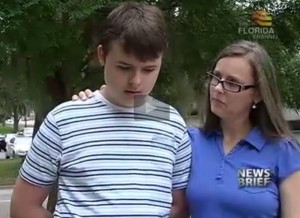
Ashli McCall of Tallahassee speaks with the Florida Channel about how the new PLSA will benefit her son Emmil who has been diagnosed with Autism.
The Florida teachers union got a lot of ink this week after it filed suit against SB 850, the bill that created a new scholarship accounts program for students with special needs. No surprise there. But a good bit of the coverage also featured something often missing in stories about parental choice.
Actual parents.
From across the state, parents of students with significant special needs are weighing in on behalf of the new Personal Learning Scholarship Accounts, which some have likened to manna from heaven and winning the lottery. And thanks to some fair reporting, readers and viewers from across the state are seeing and hearing their stories.
For example, from the Tampa Tribune:
It’s just a phenomenal opportunity,” said John Kurnik of Tampa, who hopes to open an account for his son John, who is home-schooled and has autism. “We haven’t had a whole lot of luck with services for John. The resources we have as home-school families aren’t that plentiful.
And from WEAR TV in Pensacola:
Alisha Sloan of Pensacola is applying for her son Christopher, who is living with autism. "To hear about this scholarship was very exciting to us, because with Christopher, you know, there are different things that you need, software, adaptive curriculum, different therapies that would definitely help in taking him out and homeschooling him.
And from the Florida Times Union in Jacksonville:
Some parents, such as Northside resident Melissa Ward, fear the lawsuit’s effect on students, especially students with special needs.
She home-schools Ethan, her 8-year-old third-grader, who has cerebral palsy. The family of four children has thousands of dollars in medical and therapy debts already, she said, so she rations his physical, occupational and speech therapy, paying for only one therapy at a time over several months, even though he needs them all.
She hopes the new personal learning scholarship program will help her afford more therapy and a math tutor.
“If these programs … are going to provide services to people that need help, I don’t see why getting bogged down in a bureaucratic mess would be beneficial to anyone,” she said.
“You need to look at what the purposes of the program are and what they can accomplish. I hope that people would not want to deny children what they need.”
Step Up For Students, which co-hosts this blog, is among the organizations authorized to administer PLSAs. As the lawsuit plays out, don’t be surprised if more parents speak up for the scholarship accounts. In the meantime, here are more examples of others who already have: First Coast News in Jacksonville. WCJB in Gainesville. NBC-2 in Fort Myers. The Florida Channel in Tallahassee.
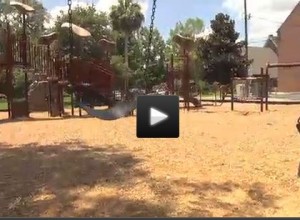
Barbara, a mom in Gainesville, speaks with TV 20 News about how the PLSA will help her son who has Down syndrome.

Ashli McCall of Tallahassee speaks with the Florida Channel about how the new PLSA will benefit her son Emmil who has been diagnosed with Autism.
 I’m kind of glad the ruckus over the parent trigger is over for now. I continue to believe that despite how mercurial it was, there are far more issues that can unite parents, the press and policymakers, if only we can wall off the static and talk.
I’m kind of glad the ruckus over the parent trigger is over for now. I continue to believe that despite how mercurial it was, there are far more issues that can unite parents, the press and policymakers, if only we can wall off the static and talk.
Perhaps this is one: I think most of us can agree that poor and minority students are getting shortchanged when it comes to getting the best teachers in traditional public schools. I think most of us can agree this is fundamentally unfair to students and teachers alike.
No matter how you define teacher quality – and let’s leave teacher evaluations out of this for now because, sheesh, that is a mess – poor and minority students get less of what is ideal and more of what isn’t. There are far more rookie teachers in high poverty schools, far more teachers who needed multiple attempts to pass certification exams, far fewer board certified. In many urban districts, the teacher transfer pipeline is one-way from inner city to leafy burbs. Given what we know about great teachers – that they are the biggest in-school variable in student achievement, that they can and do change lives – this is unconscionable.
The latest evidence is from a Stanford University study published last month. It’s based on data from the Miami-Dade School District. And it finds that even within schools, lower-performing students are more likely to be taught by the less-than-ideal teachers.
I wish issues like this got more media attention, especially in Florida. As far as I can tell, the only major news outlets that wrote about the Stanford study were Education Week and BET. I know reporters are under more stress than ever, and the timing – near the end of the Florida legislative session – couldn’t have been worse. But this isn’t a fleeting issue. (more…)
Charter schools. An arts magnet in Manatee considers converting to a charter school because of the district's ongoing financial woes. Bradenton Herald.
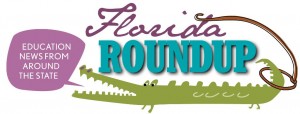 Common Core. Hillsborough school board members voice all kinds of concerns about Common Core. Tampa Bay Times.
Common Core. Hillsborough school board members voice all kinds of concerns about Common Core. Tampa Bay Times.
Tony Bennett. StateImpact Florida gives ink to anonymous, garden variety critics.
Teacher pay. Rick Scott's teacher pay raise tour continues, reports the Orlando Sentinel. Volusia teachers will probably get less than the $2,500 Scott pitched, reports the Daytona Beach News Journal.
Teacher Appreciation Week. South Florida Sun Sentinel takes note.
School spending. Budget cuts in Pasco look bigger than anticipated, reports Gradebook. The school board responds by cutting all literacy coaches and media specialists, reports the Tampa Bay Times. The Flagler school board debates potential cuts, reports the Daytona Beach News Journal. (more…)
 Having spent the better part of a quarter-century writing editorials and commentaries for a major metropolitan newspaper, I have wagged my finger with the best of them and spied more than my share of blood on the hands of shameless lawmakers. So I read New York Times columnist David Brooks routinely not only as a form of therapy but inspiration. His column on Tuesday, “Engaged or Detached,” is a wonderfully calibrated look at why the finger pointers teach us far too little.
Having spent the better part of a quarter-century writing editorials and commentaries for a major metropolitan newspaper, I have wagged my finger with the best of them and spied more than my share of blood on the hands of shameless lawmakers. So I read New York Times columnist David Brooks routinely not only as a form of therapy but inspiration. His column on Tuesday, “Engaged or Detached,” is a wonderfully calibrated look at why the finger pointers teach us far too little.
“The detached writer wants to be a few steps away from the partisans,” Brooks writes. “She is progressive but not Democratic, conservative but not Republican. She fears the team mentality will blinker her views. She wants to remain mentally independent because she sees politics as a competition between partial truths, and she wants the liberty to find the proper balance between them, issue by issue. The detached writer believes that writing is more like teaching than activism. ... She sometimes gets passionate about her views, but she distrusts her passions. She takes notes with emotion, but aims to write with a regulated sobriety.”
There is a role for “engaged” writers who fire up the troops, but Brooks’ “detached” writer is the model that should motivate those of us who want to make a difference in the educational arena. Neither I nor this blog, redefinED, always measure up to that intellectual test. But it is something to which we aspire, and I can only hope that my former colleagues in journalism would as well.
Two years ago, we launched redefinED in an attempt to help opinion leaders, the public and the mainstream media understand how public education is being transformed and redefined. So the following lead in yesterday’s New York Times was, even if by mere coincidence, gratifying to read: “A growing number of lawmakers across the country are taking steps to redefine public education … legislators and some governors are headed toward funneling public money directly to families, who would be free to choose the kind of schooling they believe is best for their children, be it public, charter, private, religious, online or at home.”
We are still early in this transition from a one-size-fits-all assembly-line model of public education to an approach that stresses empowerment, diversity and customization, but this shift to expanded school choice is accelerating and it’s inevitable. And as these changes unfold, redefinED will continue to aspire to be a place where thoughtful people can - with civility and mutual respect - discuss how best to address all the challenges this transformation is producing.
In the 1980s and '90s, when the National Education Association was a leader in trying to improve public education, we use to say change is inevitable but improvement is optional. This is especially true today, which is why the dialogue we’re having at redefinED is so important.
Thanks for staying with us.
Editor's note: The Rev. Manuel Sykes is pastor of Bethel Community Baptist Church and president of the St. Petersburg NAACP, an active chapter on Florida's west coast. In this commentary, he responds to a recent Tampa Bay Times column that criticized a federal tax credit scholarship bill offered by U.S. Sen. Marco Rubio. The Times also published a letter to the editor from Rev. Sykes in today's editions.
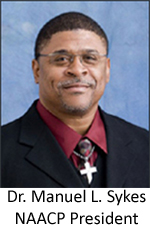 Florida offers the nation’s best lesson on whether private school options can help poor children, but the Tampa Bay Times seems uninterested in what these parents and students are telling us. Instead, it is busy pointing a distinctly partisan finger.
Florida offers the nation’s best lesson on whether private school options can help poor children, but the Tampa Bay Times seems uninterested in what these parents and students are telling us. Instead, it is busy pointing a distinctly partisan finger.
Argue if you want about whether the federal government should provide K-12 scholarships to low-income students, but the tax credit scholarship plan introduced by Republican U.S. Sen. Marco Rubio is not “bankrupt” or “craven.” It is instead a learning option that economically disadvantaged students wouldn’t otherwise have, and to label it as “money laundering” represents the kind of rhetorical excess that cheapens our public debate.
In Florida, more than 50,000 students are on a similar plan, and the results are encouraging to those of us who work with struggling children. The students who use the Florida Tax Credit Scholarship are truly poor – incomes barely above poverty and averaging less than $25,000 for a household of four – and more than two thirds of them are black or Hispanic. State research tells us they were among the lowest academic performers in the public schools they left behind, and testing results show they are making the same academic gains as students of all income levels nationally. Just as encouraging, the traditional public schools that are most impacted by students who choose the scholarships are themselves experiencing higher learning gains.
The educational results don’t seem to matter to those who prefer instead to dismiss scholarships as some kind of Republican conspiracy. Never mind that nearly half the Democrats in Florida’s Legislature also support this option, including a majority of the Black Caucus. Never mind those of us who work in disadvantaged communities in St. Petersburg and see children for whom these opportunities can make the difference between a diploma or a jail cell. Never mind that the Black Alliance for Educational Options, which represents elected black Democrats across the nation, has expressed its support for Rubio’s bill. (more…)
Common Core. More signs that an implementation delay is in the works. StateImpact Florida. Orlando Sentinel. Associated Press.
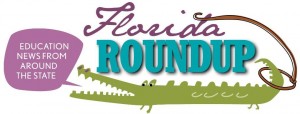 School spending. South Florida Sun Sentinel: "The Broward school district overpaid a security firm by $129,000, according an internal audit that found the district grossly mismanaged the contract, paid unnecessary overtime and late fees, and even paid guards after the contract expired." Brevard Superintendent Brian Binggeli hears from upset parents and teachers objecting to budget cuts, reports Florida Today.
School spending. South Florida Sun Sentinel: "The Broward school district overpaid a security firm by $129,000, according an internal audit that found the district grossly mismanaged the contract, paid unnecessary overtime and late fees, and even paid guards after the contract expired." Brevard Superintendent Brian Binggeli hears from upset parents and teachers objecting to budget cuts, reports Florida Today.
Special needs students. Parents say they'll fight district plans to shutter two schools for special needs students in Broward. South Florida Sun Sentinel.
Gays and lesbians. More than 100 supporters of a proposed Gay-Straight Alliance at a Lake County middle school turn out for a school board meeting. Orlando Sentinel.
Teacher evals. Mismatch between eval results and school grades concerns state education officials, reports Orlando Sentinel and Gradebook.
Teacher pay. Is Scott's proposal a raise or a bonus? Lakeland Ledger.
Educator conduct: The Sarasota Herald Tribune reports Manatee district officials did not follow up on tips about an assistant football coach's possible misconduct involving a student and decided to close an inquiry in time for the playoffs.
Diane Ravitch. Weighs in on school closings in Brevard. (Hat tip: Florida Today).
More conspiracy! The editorial board of the The Oklahoman takes a rational look at the Jeb-Bush-corporate-conspiracy theory being promoted by a group called In the Public Interest and advanced by mainstream media.
School boards. Manatee board member Julie Aranabar won't face charges for a potential public records violation. Sarasota Herald Tribune.
 The Orlando Sentinel recently published a blog entry about a new website that opposes students using publicly-funded vouchers to attend private schools that teach creationism. The site asserts, “Teaching creationism with public money is unconstitutional. It violates the First Amendment of the U.S. Constitution which lays out a clear separation of church and state.”
The Orlando Sentinel recently published a blog entry about a new website that opposes students using publicly-funded vouchers to attend private schools that teach creationism. The site asserts, “Teaching creationism with public money is unconstitutional. It violates the First Amendment of the U.S. Constitution which lays out a clear separation of church and state.”
I’m fine with citizens opposing the teaching of creationism. I would not send my child to a school that taught creationism in lieu of evolution, but the assertion that it’s unconstitutional is false.
In the 1925 Pierce v. Society of Sisters decision, the U.S. Supreme Court ruled parents are responsible for determining how and what their children are taught. And in the 2002 Zelman v. Simmons-Harris decision, the court ruled parents may use public money to pay for tuition at faith-based schools provided their choice is genuinely independent, and the funds go first to the parents and then to the school.
Florida’s school voucher programs all adhere to the Zelman requirement that funds go first to the parent and then the school, which is why using publicly-funded vouchers to attend faith-based schools is an exercise of the First Amendment’s freedom of religion clause, and not a violation of the Establishment Clause. (By the way, the term “separation of church and state” does not appear in the U.S. Constitution. That phrase was used by President Thomas Jefferson in a January 1, 1802 letter he wrote to the Danbury Baptist Association of Connecticut, reassuring them that he opposed the government interfering with their religious practices.)
The Sentinel wrote that some state officials think tax credit scholarships are more constitutional than vouchers because tax credit funds never touch the state treasury, but, again, the key to the Zelman decision is the path the funds travel to arrive at a faith-based school. Once public funds are given to the parents, they become less public and more private, which is why their expenditure is an exercise of religious freedom and not government-supported religion. (more…)
Florida's status. Matt Reed, Florida Today's editorial page editor, takes a look at NAEP data and the most recent Education Week Quality Counts report and concludes: "We obviously have room to improve. But our system is neither starving, as educators always say. Nor is it “broken” or “failing,” as reformers keep telling us."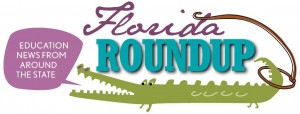
Florida's status, Part II. Diane Ravitch's latest take, after quoting a Florida teacher at length: "There is no Florida miracle. Education has only gotten worse over the past few years, no matter how schools, districts and the state itself game the system. And, contrary to what the media will tell you, it is NOT teachers’ fault, unions’ fault, and I won’t even blame it on the kids or their parents this time. It is the fault of education “reform” led by Jeb Bush et al."
Charter schools. The South Florida Sun Sentinel writes up the bill that would require school districts to share unused or underused facilities with charter schools. Bad idea, editorializes the Palm Beach Post.
Gays and lesbians. The Lake County School Board considers rules that would keep a Gay-Straight Alliance from forming at a middle school. Orlando Sentinel.
Teacher evaluations. Tampa Bay Times on one impact (or not) of the new system in Hillsborough: "After years of planning and training, observation and deliberation, the first wave of firings has begun under a teaching-improvement project funded by the Bill & Melinda Gates Foundation. The tally: Three teachers." (more…)